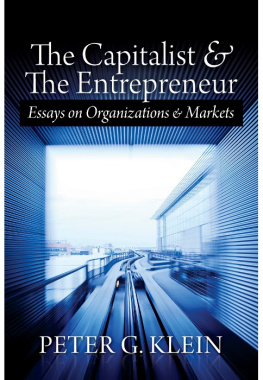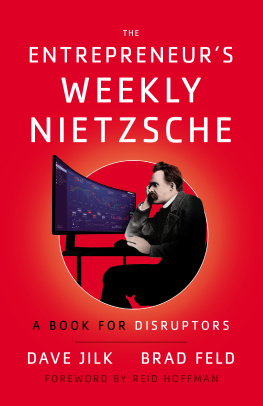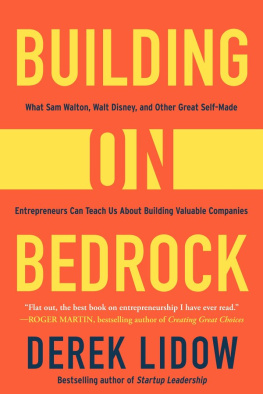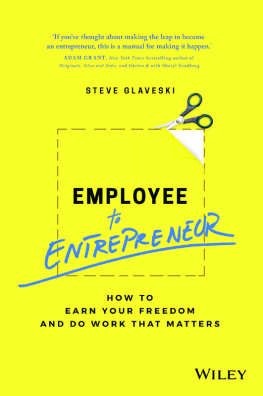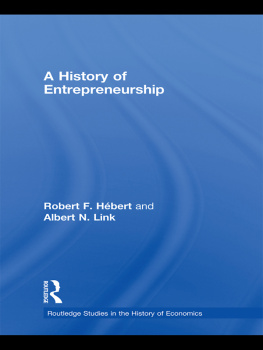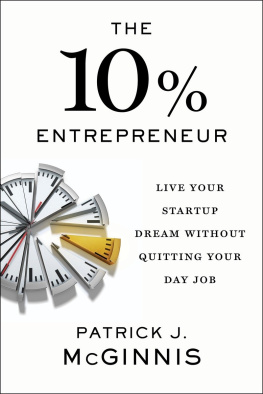The Capitalist and the Entrepreneur
Essays on Organizations and Markets
Peter G. Klein


Copyright 2010 by the Ludwig von Mises Institute
Published under the Creative Commons Attribution License 3.0.
http://creativecommons.org/licenses/by/3.0/
Ludwig von Mises Institute
518 West Magnolia Avenue
Auburn, Alabama 36832
Ph: (334) 844-2500
Fax: (334) 844-2583
mises.org
10 9 8 7 6 5 4 3 2 1
ISBN: 978-1-933550-79-4
The entrepreneur hires the technicians, i.e., people who have the ability and the skill to perform definite kinds and quantities of work. The class of technicians includes the great inventors, the champions in the field of applied science, the constructors and designers as well as the performers of the most simple tasks. The entrepreneur joins their ranks as far as he himself takes part in the technical execution of his entrepreneurial plans. The technician contributes his own toil and trouble; but it is the entrepreneur qua entrepreneur who directs his labor toward definite goals. And the entrepreneur himself acts as a mandatary, as it were, of the consumers.
Ludwig von Mises, Human Action (1949), p. 300
Foreword
by Doug French
Entrepreneurship has been a hot buzzword recently. Classes in entrepreneurship are being taught at both the high school and college levels. The Ewing Marion Kauffman Foundation: The Foundation of Entrepreneurship has big fancy websites advertising that its President and CEO will give a State of Entrepreneurship Address. There are global entrepreneurship conferences being held in far-flung places like Dubai. Learning programs are offered to test your Entrepreneurial IQ. The United States government even has an entrepreneurship website, advertising a Presidential Summit on Entrepreneurship, Entrepreneurship Law, and a Global Entrepreneurship Week.
Is it that simple? If more classes, websites and conferences are offered will we really have more Ewing Kauffmans? A man who as a child was bedridden for a year with a heart ailment but used the time to read 40 books per month. After WWII he worked as a pharmaceutical salesman until, with a $5,000 investment, he started Marion Laboratories. Company sales were just $39,000 in the first year of operation but four decades later Kauffmans company would have revenues totaling $930 million. In 1989, Kauffman merged Marion with Merrell Dow Pharmaceuticals, making more than 300 millionaires of Marion investors and employees.
Kauffman himself would likely have not stepped into the role of entrepreneur if not for the stupidity of his employer, Lincoln Laboratories. A natural salesman and hard worker, Kauffman in just his second year earned more in commissions than the company president did in salary. In response, the president cut Kauffmans commissions. Despite the reduction, Kauffman still out-earned the Lincoln head man the following year, so he took away some of my territory, which was the same as taking away some of my income, Kauffman related later. So, I quit and I started Marion Laboratories in the basement of my home.
The government can talk about entrepreneurship and act like it is promoting it, but all of what government does by taxing and regulating impedes the entrepreneur. Its hard to imagine that even Ewing Kauffman could make a similar initial investment today (roughly $44,000 adjusted for inflation), start a firm in his basement, and build it to a billion dollar company. The local authorities in Kansas City were not all that concerned about a fledgling pharmaceutical company operating from Kauffmans home in 1950. Today, there would be permits to obtain, approvals to be gained and license fees to pay. The majority of the legislation that has given the Food and Drug Administration (FDA) its enormous power was enacted after Kauffmans company was up and running.
But as long as there is some shred of a market available, entrepreneurs find a way. They see opportunity others dont. They take financial risks that most people would consider unfathomable. The government edicts, bureaucratic roadblocks and oppressive taxation that discourage the hardiest of souls only serve to challenge and inspire creative entrepreneurs while weeding out potential competitors. All of the wonderful goods and services that we enjoy are due to entrepreneurship and the firms that are created to carry out the dreams of the entrepreneur and serve customers.
It is the firm where most people work. Maybe its a small firm or a big one or one in-between, but unless one is a solo contractor most people trade their time and talent for a paycheck to pay the bills. The vast majority of working people dont give much thought to this framework. They clock in, they clock out. Payday every couple of weeks. At the same time most people will spend the majority of their non-sleeping hours on the job, working for a firm or series of different firms. And work life maybe the single most important part of a persons life. Reportedly 95% of the people who are happy on the job are happy with their life as a whole. But salaried workers, from the lowest paid to the highest, take no risk. And although they are critical to the production of products and services, they are a cost of doing business.
Conversely, the entrepreneur is only paid when the market accepts his or her product. If the market rejects the product, the entrepreneur is not only not rewarded, but most times will lose capital that had been saved previously and was invested in the idea and production. As Kauffman explained, The odds were strongly against me when I started. There were two or three thousand pharmaceutical businesses started after World War II, and only three ever really succeeded.
As vital as entrepreneurship and the firm are to the working of the market and lives of virtually all working men and women, most schools of economic thought are silent on the subject. Even the work that has been done is incomplete and contradictory. Economists cant even agree on what entrepreneurship is or what exactly entrepreneurs like the late Ewing Kauffman do. And the apparatus that facilitates the manifestation of the entrepreneurial visionthe firmis but a black box where inputs enter and outputs emerge, like so much magic.
But like so many market phenomena that modern economics chooses to ignore or get wrong, an Austrian economist has entered the black box, examining its contents for a better understanding of not only what entrepreneurs are, but what they do and why they do it. Peter G. Klein has devoted his entire career to understanding the entrepreneur and the firm, bringing a distinctive Austrian approach to the problem while drawing from what all schools of thought have to contribute.
This book contains the fruit of Dr. Kleins labors. And while the majority of the book was taken from articles appearing in academic journals, this book should not only be read by students and academics. Klein provides valuable insight that business owners and managers will find useful. As heroic as the entrepreneur may appear or thoughtful as the manager may seem, they dont operate in a vacuum. Often they have no one to talk to and nothing to keep them in check but their own egos, which in many cases offers no check at all but the opposite.
The yearning for knowledge in this area is considerable. Considerable space at most any bookstore is provided for the many and varied management books. There are nearly as many different management books offered as diet books, with each genre being as faddish as the next. Management theorists crank out a continual stream of books full of business advice that readers find unreadable, writes

